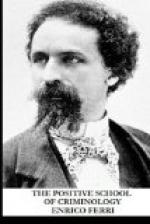Criminal justice has taken the same historical course of development as medicine. The classic school of criminology is still in the same stage, in which medicine was before the middle of the 19th century. It deals with theft, murder, fraud, as such. But that which claims so much of the attention of society has been forgotten by the classic school. For that school has forgotten to study the murderer, the thief, the forger, and without that study their crimes cannot be understood.
Crime is one of the conditions required for the study of the criminal. But, the same crime may require the application of different remedies to the personalities of different criminals, according to the different anthropological and social conditions of the various criminals. There is a fundamental distinction between the anthropological and social types of criminals, whom I have divided into five categories, which are today unanimously accepted by criminalist anthropologists, since the Geneva congress offered an opportunity to explain the misapprehension which led some foreign scientists to believe that the Italian school regarded one of these types (the born criminal) merely as an organic anomaly.
Just a word concerning each one of these five types.
The born criminal is a victim of that which I will call (seeing that science has not yet solved this problem) criminal neurosis, which is very analogous to epileptic neurosis, but which is not in itself sufficient to make one a criminal. Our adversaries had the idea that the mere possession of a crooked nose or a slanting skull stamped a man as predisposed by birth to murder or theft. But a man may he a born criminal, that is to say, he may have some congenital degeneration which predisposes him toward crime, and yet he may die at the age of 80 without having committed any crime, because he was fortunate enough to live in an environment which did not offer him any temptation to commit crime. Again, are not many predisposed toward insanity without ever becoming insane? If the same individual were to live under unfavorable conditions, without any education, if he were to find himself in unhealthy telluric surroundings, in a mine, a rice field, or a miasmatic swamp, he would become insane. But if instead of living in conditions that condemn him to lunacy he were to be under no necessity to struggle for his daily bread, if he could live in affluence, he might exhibit some eccentricity of character, but would not cross the threshold of an insane asylum. The same happens in the case of criminality. One may have a congenital predisposition toward crime, but if he lives in favorable surroundings, he will live to the end of his natural life without violating any criminal or moral law. At any rate we must drop the prejudice that only those are criminals on whose backs the judge has pasted a number. For there are many scoundrels at large who commit crime with impunity, or who brush the edge of the criminal law in the most repulsive immorality without violating it.




